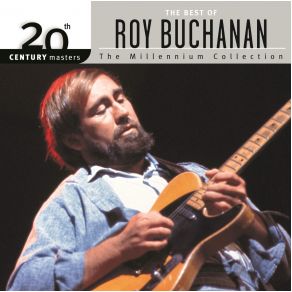20th Century Masters - The Millennium Collection: The Best of Roy Buchanan
Download links and information about 20th Century Masters - The Millennium Collection: The Best of Roy Buchanan by Roy Buchanan. This album was released in 2002 and it belongs to Blues, Rock, Blues Rock genres. It contains 12 tracks with total duration of 01:05:16 minutes.

|
|
|---|---|
| Artist: | Roy Buchanan |
| Release date: | 2002 |
| Genre: | Blues, Rock, Blues Rock |
| Tracks: | 12 |
| Duration: | 01:05:16 |
| Buy it NOW at: | |
| Buy on iTunes $4.99 | |
| Buy on Songswave €1.84 | |
Tracks
[Edit]| No. | Title | Length |
|---|---|---|
| 1. | Sweet Dreams | 3:33 |
| 2. | Pete's Blue | 7:17 |
| 3. | The Messiah Will Come Again | 5:56 |
| 4. | Filthy Teddy | 3:11 |
| 5. | After Hours | 6:15 |
| 6. | Five String Blues | 6:26 |
| 7. | Hey Joe | 5:29 |
| 8. | Roy's Bluz | 6:02 |
| 9. | CC Ryder | 6:05 |
| 10. | Country Preacher | 3:32 |
| 11. | Wayfaring Pilgrim | 5:08 |
| 12. | I'm Evil (Live) | 6:22 |
Details
[Edit]Roy Buchanan's five albums for Polydor, released between 1972 and 1975 and excerpted on this midline-priced best-of, were a worthy compromise between artistic expression and commercial considerations. In the late '60s and early '70s, record companies and music journalists beat the bushes looking for guitar heroes on the scale of Eric Clapton and Jimi Hendrix and came up with at least a couple, Johnny Winter in Texas and Buchanan in Washington, D.C. Polydor no doubt signed Buchanan hoping it had a Clapton/Hendrix-size star, but he lacked the temperament for the big time and merely fulfilled his contract, though he was then scooped up by Atlantic for another try. The tracks here, a good if brief summary of the Polydor years, illustrate both his strengths and weaknesses. The major, perhaps sole strength is the guitar work, which is utterly distinctive within a blues context and at times overwhelming. Buchanan can wring tremendously emotional runs from his axe and then, as in the version of "Hey Joe" here, let forth a sonic assault that rivals any Hendrix ever managed. To listen to this album is to hear a great blues guitarist inventing his art before you. On the tracks from the early albums (the compilation is sequenced chronologically), producer Peter Kieve Siegel was mostly content with that, but on the later albums, more of an attempt was made to turn Buchanan into a singer (his voice was limited and hesitant), or to add other elements, including horn sections and backup singers, to expand the music's appeal beyond blues aficionados. The results are less interesting, but that's what you expect at a major label. So, while not actually the best of Roy Buchanan, this compilation encapsulates his tenure at Polydor and provides a taste for the neophyte of what he sounded like.